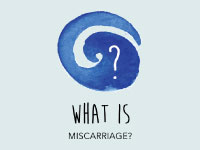Miscarriages are devastating, but what can also be difficult, particularly if you’ve suffered several pregnancy losses, is not knowing what caused your loss and trying to find answers.
There are a number of possible reasons that a miscarriage may occur, and often it’s not until extensive testing is done that you may find out why. It’s also important to know that in around 50% of cases, a medical explanation for your loss will not be found. For couples in this category, most medical professionals will say that the chance of a healthy pregnancy is no different to the statistical chance of pregnancy of any other couple (taking into account the woman’s age).
While this news may be reassuring for some, others may feel disappointed as there is nothing tangible that can be ‘fixed’. These women may find it helpful to look into some holistic therapies such as acupuncture, which may have a positive effect on pregnancy outcomes, but also so they feel like they are being proactive and taking some control back in what can be a time of feeling very out of control.
We would advocate that if you have experienced two or more consecutive miscarriages to seek medical advice and request some basic testing. This is especially pertinent if you are over the age of 35, and in fact in some cases, practitioners will conduct testing after one loss if you are over 35.
Let’s look at some of the most common causes of miscarriage. It can appear very overwhelming and even a bit scary, but please know that even with a positive diagnosis of one or more of these issues, you can still go on to have a healthy pregnancy with the right treatment, care and support.
Chromosomal Abnormalities
Approximately 60-70% of miscarriages in the first 12 weeks are due to major chromosomal abnormalities. In fact, 9 out of 10 genetically abnormal pregnancies will not survive past 12 weeks. These are generally one-off random occurrences and will not recur – unless advanced maternal age or compromised egg quality is a factor. In some cases, there can be a genetic predisposition that may result in a trisomy or monosomy.
Balanced Translocations
Balanced translocations are where a chromosomal abnormality is carried by either of the partners, and if passed on, will cause the fetus to be abnormal. You may not have any signs or knowledge of the abnormality until such time as a comprehensive blood karyotype test is done. In these cases, you may choose to ‘roll the dice’ and try naturally until such time as a pregnancy is successful. The other option is to undertake Preimplantation Genetic Diagnosis (PGD), an extended form of IVF whereby each embryo is tested for the particular translocation and effectively weeded out.
Uterine Abnormalities
Sometimes the uterus can have physical anomalies that can affect our ability to carry a baby. These include an irregular shaped uterus, a septate uterus or uterine fibroids. These abnormalities can generally be detected by having a hysterosalpingogram, an outpatients x-ray procedure. In some cases, minor surgery will be needed to correct an abnormality.
The lining of the uterus also plays a very important role in housing the embryo and a few women will have thinner than normal endometrium lining (optimum is 6mm and above in thickness). Again, once diagnosed, this can be relatively easily treated with hormone medication.
Blood Clotting Disorders (thrombophilias)
Blood clotting disorders can either be genetic or develop with age and Antiphospholipid Antibodies can cause the blood to clot more easily and effectively, causing a blockage in the forming placental blood vessels. Another condition called Factor V Leiden is an inherited version of thrombophilia and can contribute to reduced blood flow to the baby later in pregnancy, which needs to be closely monitored.
Autoimmune Disorders
Put simply, sometimes our immune system can become confused and attack its own tissue – ie. the body sees the pregnancy as an invader and attacks it. One of the most common immune disorders is Antiphospholipid Antibodies (ANA), though there are many different types of immune disorders that can affect pregnancy. Again, blood tests can determine if you are affected by any of these issues.
Natural Killer Cells
Immune cells or ‘Natural Killer Cells’ are actually important for detecting foreign cells in the body such as infections or cancer. However, some women can have higher than normal levels of these NKCs which can in turn cause the body to attack the seemingly foreign fetus. These NKCs can be found in either the blood or the uterus or in some cases, in both. Once detected, treatment for NKC is quite simple and very effective.
Hormonal Issues
- Low Progesterone – medical practitioners can tend to have differing views on this one, ie, one school of thought is that low progesterone can cause miscarriage, while others believe that the progesterone is low because the pregnancy has not implanted successfully. Certainly when undergoing fertility treatments such as IVF, progesterone supplements are given as a matter of course, because in an artificial cycle, hormones need to be supplemented until such time as the placenta can take over.
- Follicle Stimulating Hormone (FSH) – women with high FSH levels are more likely to experience miscarriage because their ovaries have become prematurely menopausal.
Maternal Age
While we may not feel old physically, unfortunately when it comes to fertility and miscarriage, our eggs play a huge part in the likelihood of success. Advanced maternal age is generally defined as being 35 or older, though most people would agree that 40 or older sees a much bigger decline in both ability to become pregnant and of course the chance of having a healthy pregnancy⁵. That’s not to say it won’t happen! There are plenty of examples of women over 40 easily conceiving and having healthy babies. But when talking about miscarriage, the risks are certainly higher and the chances of early pregnancy loss are more likely.
Recurrent Pregnancy Loss
The term recurrent miscarriage is used when women experience two or more early pregnancy losses⁶ ⁷. It affects up to 5% of couples⁸ and the emotional toll can be significant. There are many proposed causes, however what can often be most difficult for women emotionally, is that in a number of cases, the cause will remain unknown⁹.

Generally, after having experienced several losses in a row, a couple will be referred to a fertility specialist for investigative testing. Some GPs will be able to provide a referral for these tests, but it’s more likely that you will see a specialist.
Comprehensive Testing
Below is a list of what is generally tested during investigations for recurrent pregnancy loss:
In general, it is best to see your healthcare professional if any of these occur:
- Male and female karyotype
- AMH, LH, FSH, oestradiol
- TSH Prolactin, Testosterone
- Full Blood Count
- Cardiolipin antibodies, Lupus anticoagulant
- Protein C, Protein S, anti-thrombin III
- APCR
- Factor V Leiden
- Prothrombin gene mutation
- MTHFR mutation
- Fasting glucose, insulin, homocysteine
- Thyroid antibodies
- Peripheral blood activated natural killer cells
- Uterine natural killer cells and other endometrial pathology
- Pelvic ultrasound scan
- Hysteroscopy (and sometimes laparoscopy)
- Semen analysis and sperm DNA fragmentation
Shared Story
Shared Story - 'Pushing 40'
I experienced my first loss 2 years ago after having had two normal pregnancies. I fell pregnant and had all the usual symptoms I'd had in my other pregnancies... that was until I started to experience some spotting.
Continue Reading
2. Li YH, Marren A. Recurrent pregnancy loss: A summary of international evidence-based guidelines and Practice. Australian Journal of General Practice. 2018;47(7):432–6. doi:10.31128/ajgp-01-18-4459
5. Andersen A-MN. Maternal age and fetal loss: Population Based Register Linkage Study. BMJ. 2000;320(7251):1708–12. doi:10.1136/bmj.320.7251.1708
6. Royal College of Obstetricians and Gynaecologists.The Investigation and Treatment of Couples with Recurrent First Trimester and Second Trimester Miscarriage. London: RCOG, 2011.
7. Practice Committee of the American Society for Reproductive Medicine. Evaluation and treatment of recurrent pregnancy loss: A committee opinion. Fertil Steril 2012;98:1103–11. doi: 10.1016/j.fertnstert.2012.06.048.
8. van den Berg MMJ, van Maarle MC, van Wely M, Goddijn M. Genetics of early miscarriage. Biochimica et Biophysica Acta (BBA) - Molecular Basis of Disease. 2012;1822(12):1951–9. doi:10.1016/j.bbadis.2012.07.001.
9. Li YH, Marren A. Recurrent pregnancy loss: A summary of international evidence-based guidelines and Practice. Australian Journal of General Practice. 2018;47(7):432–6. doi:10.31128/ajgp-01-18-4459
10. Jeve YB, Davies W. Evidence-based management of recurrent miscarriages. J Hum Reprod Sci. 2014 Jul;7(3):159-69.

Emotional Support Resources
We have created a suite of support resources that we hope will support and nurture you during this time.
Read more
What is Miscarriage?
Sadly, miscarriages are a common occurrence with up to one in five pregnancies ending before week 20.
Read more
Treatment and Procedures
Early pregnancy loss is such an individual experience that the treatment and procedures around it are different for everyone.
Read more